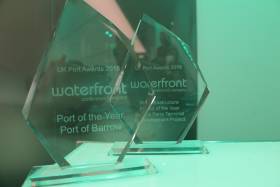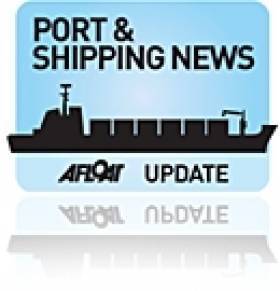Displaying items by tag: UK Ports Conference
Irish Sea Port of Barrow Wins UK Port of The Year Award At Annual Conference in London
#Ports&Shipping - An Irish Sea port, Barrow in north-west England has won the prestigious UK Port of the Year Award at this year’s 10th annual UK Ports Conference held in the heart of London.
According to Associated British Ports (ABP) which operates the Port of Barrow in Cumbria was presented (among categories) the Port of the Year Award. The award was open to all ports and terminals across the UK that could demonstrate both optimum operational performance and outstanding customer service in the last 12 months. Two other ABP ports – Barrow and Southampton made the final shortlist, with the Port of Barrow ultimately scooping first prize.
The panel of judges consisted of esteemed industry experts, specially selected for their wide-ranging and in-depth experience and knowledge of the sector, including Tim Morris, Chief Executive of the UK Major Ports Group, Craig Huntbatch, Business Line Director at Royal HaskoningDHV and Carly Fields, Editor of Port Strategy magazine.
The Port of Barrow was recognised largely due to its successful community engagement campaign, which was organised to celebrate the Ports 150th anniversary in 2017 and saw awareness about its economic contribution and bright future increase among the local community.
Together with its sister Ports of Garston, Silloth and Fleetwood, ABP’s port of Barrow supports more than 8,100 jobs in the North West and contributes more than £550 million to the UK economy every year.
UK Ports Conference Heads for Warrenpoint Port
#UKportConference – Warrenpoint Port is to host the British Ports Association's 2014 conference on the 1 and 2 October.
This is only the second time in the 22 year history of the BPA that a venue has been held in Northern Ireland.
As reported yesterday on Afloat.ie, the Co. Down port is experiencing an upturn in trade in addition to welcoming the first cruiseship caller to the scenic setting of Carlingford Lough.
The flagship industry event is expected to attract approximately 200 delegates including BPA Members and Non Members, industry partners and key stakeholders.
It provides the main opportunity for the industry to discuss all the latest policy, practice, trends and technology developments in the ports and harbours sector from across the UK and Europe.
The event will be based in the nearby Hastings Slieve Donard Resort & Spa in Newcastle, and is also attract delegates from across the island of Ireland and further afield.
As in previous years the 2014 conference will offer a unique opportunity for BPA members and non members alike, to catch up with all the latest policy, practice, trends and technology in the ports and harbours sector from across the UK from a range of industry speakers.
For further details visit the BPA website here for registration, conference programme and contact details.






























































